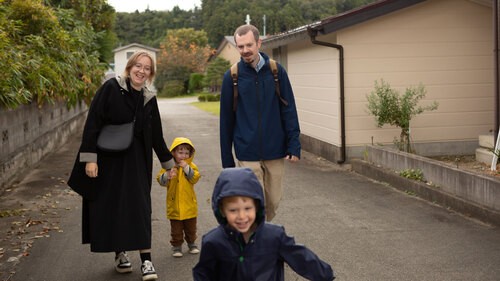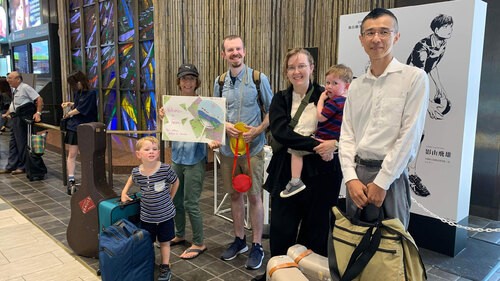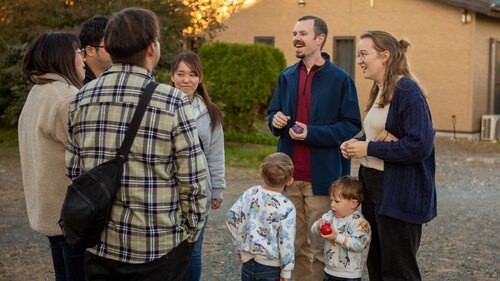Learning to Live Like Them

The Fraser Family out for a walk in their new neighborhood.
When God sent his Son to dwell among us, Jesus not only stepped into our world as God incarnate, but humbled himself to a position where others were invited to step into his world. The baby Jesus grew up learning how to live like the people around him—how to speak, eat, walk, laugh, and pray like they did.
For us, in Japan, our task is now to model Christ’s incarnational witness to the people here, becoming—as much as we can—one of them, allowing them to teach us, so that we, in turn, can teach them the good news of their incarnate Savior. We were hoping to keep our “American-ness” to a minimum. We knew Americans in Japan can be negatively stereotyped. We had been given enough understanding and advice to hopefully have some sensitivity to Japanese culture on our arrival. What we didn’t expect was the great care and understanding that would be shown to us.
Disembarking from our plane, we dragged our carry-ons, backpacks, two tired sons, and two tired selves down the jet bridge. As we regrouped and prepared to walk through the rest of Tokyo airport, a polite voice spoke behind us, “Excuse me, please place your suitcases here.” We turned to be greeted by a smiling, professional Japanese airport employee motioning for us to place our belongings onto her cart. We were taken aback for a moment, since we hadn’t perceived ourselves as being in need of a cart, but we gratefully accepted the assistance. She then proceeded to load and secure our bags, and began driving us to customs. Our feelings of gratitude quickly turned to immense embarrassment. The cart moved slowly. Very slowly. I (Paul) had to walk alongside, since there were not enough seats. I was easily outpacing the cart even while carrying a backpack and pulling a suitcase. The cart played a loud, cheerful tune as it went—a way of telling others we were coming. We felt that all eyes were on us. Arriving at customs, our helper quickly unloaded our bags. We thanked her and parted ways.
Despite the feeling of embarrassment, we also sensed something else: everything about that experience, the gentle speed, the song being played, the way she approached us rather than waiting for us to ask for a ride—this was intentional courtesy, providing comfort and safety for us. Her actions were considerate and directed toward these tired Americans with small children and too many bags to carry. In that moment she knew us, even anticipated us, and stepped into our world to help us.
As we were going through customs, another employee sent us to the priority line (which was only 9 people long) allowing us to skip the regular line of many dozens of people. As far as I can understand, this was probably done because most of the passengers from our flight had already made it through customs. We also had two tired kids and had obviously been struggling with writing down all the information we needed to show for immigration and customs. Another Japanese person had entered our world and helped us.
Later, as we waited at the baggage carousel, we were wondering how we would carry all eight of our checked items, weighing 400 lbs total. As our wait grew long, I worried we were at the wrong carousel or our bags had been mishandled and lost. Then, as I looked around, I noticed some items that looked like ours, gathered nicely together on the other side of the carousel. Three airport employees were standing next to them and looking for us! They confirmed we were the owners and helped us load our cart, which was then brought to a shipping company in the airport and delivered to the mission house in Sendai. Once again, we were known, needs and all, as these Japanese friends entered into our world to meet us where we were, similar to the way Jesus entered our world and served those he met.
Our very first day in Sendai was another instance of someone entering our world to help us. We spent the day in a city office filling out page after page of the paperwork required for residency in Japan, but neither Alexa nor I lifted a pen! The President of the Japanese Lutheran Brethren Church, Wakamatsu Sensei, filled out each page on our behalf. We just sat there, answering questions as needed. He not only filled in each document but also translated our American forms into Japanese so that the city office employees could correctly file our information! President Wakamatsu was being incarnational to us so that we could begin to be incarnational, and dwell legally, among the Japanese. It was a long, slow, detailed process that we would have been unable to complete on our own without him coming to us, and representing us.
As we seek to live incarnationally in Japan, our process so far has involved seeking out others to show us what it means to be Japanese. Some things we understand; much more is yet to be learned. We were given good footing these past two years at Rock of Ages Lutheran Brethren Church in Seattle, Washington, as we served in the church’s Japanese ministry. Now we are fleshing that out, coming alongside the Church here in Japan, with hopes of bringing the good news of Jesus Christ to the Japanese people.
Through all this, we continue to learn how to dwell with them. We practice the Japanese language as much as we are able. We learn how to remove our shoes and step into slippers before entering a house. We learn which foods to buy and for what purposes. For example, the difference between
For us, in Japan, our task is now to model Christ’s incarnational witness to the people here, becoming—as much as we can—one of them, allowing them to teach us, so that we, in turn, can teach them the good news of their incarnate Savior. We were hoping to keep our “American-ness” to a minimum. We knew Americans in Japan can be negatively stereotyped. We had been given enough understanding and advice to hopefully have some sensitivity to Japanese culture on our arrival. What we didn’t expect was the great care and understanding that would be shown to us.
Disembarking from our plane, we dragged our carry-ons, backpacks, two tired sons, and two tired selves down the jet bridge. As we regrouped and prepared to walk through the rest of Tokyo airport, a polite voice spoke behind us, “Excuse me, please place your suitcases here.” We turned to be greeted by a smiling, professional Japanese airport employee motioning for us to place our belongings onto her cart. We were taken aback for a moment, since we hadn’t perceived ourselves as being in need of a cart, but we gratefully accepted the assistance. She then proceeded to load and secure our bags, and began driving us to customs. Our feelings of gratitude quickly turned to immense embarrassment. The cart moved slowly. Very slowly. I (Paul) had to walk alongside, since there were not enough seats. I was easily outpacing the cart even while carrying a backpack and pulling a suitcase. The cart played a loud, cheerful tune as it went—a way of telling others we were coming. We felt that all eyes were on us. Arriving at customs, our helper quickly unloaded our bags. We thanked her and parted ways.
Despite the feeling of embarrassment, we also sensed something else: everything about that experience, the gentle speed, the song being played, the way she approached us rather than waiting for us to ask for a ride—this was intentional courtesy, providing comfort and safety for us. Her actions were considerate and directed toward these tired Americans with small children and too many bags to carry. In that moment she knew us, even anticipated us, and stepped into our world to help us.
As we were going through customs, another employee sent us to the priority line (which was only 9 people long) allowing us to skip the regular line of many dozens of people. As far as I can understand, this was probably done because most of the passengers from our flight had already made it through customs. We also had two tired kids and had obviously been struggling with writing down all the information we needed to show for immigration and customs. Another Japanese person had entered our world and helped us.
Later, as we waited at the baggage carousel, we were wondering how we would carry all eight of our checked items, weighing 400 lbs total. As our wait grew long, I worried we were at the wrong carousel or our bags had been mishandled and lost. Then, as I looked around, I noticed some items that looked like ours, gathered nicely together on the other side of the carousel. Three airport employees were standing next to them and looking for us! They confirmed we were the owners and helped us load our cart, which was then brought to a shipping company in the airport and delivered to the mission house in Sendai. Once again, we were known, needs and all, as these Japanese friends entered into our world to meet us where we were, similar to the way Jesus entered our world and served those he met.
Our very first day in Sendai was another instance of someone entering our world to help us. We spent the day in a city office filling out page after page of the paperwork required for residency in Japan, but neither Alexa nor I lifted a pen! The President of the Japanese Lutheran Brethren Church, Wakamatsu Sensei, filled out each page on our behalf. We just sat there, answering questions as needed. He not only filled in each document but also translated our American forms into Japanese so that the city office employees could correctly file our information! President Wakamatsu was being incarnational to us so that we could begin to be incarnational, and dwell legally, among the Japanese. It was a long, slow, detailed process that we would have been unable to complete on our own without him coming to us, and representing us.
As we seek to live incarnationally in Japan, our process so far has involved seeking out others to show us what it means to be Japanese. Some things we understand; much more is yet to be learned. We were given good footing these past two years at Rock of Ages Lutheran Brethren Church in Seattle, Washington, as we served in the church’s Japanese ministry. Now we are fleshing that out, coming alongside the Church here in Japan, with hopes of bringing the good news of Jesus Christ to the Japanese people.
Through all this, we continue to learn how to dwell with them. We practice the Japanese language as much as we are able. We learn how to remove our shoes and step into slippers before entering a house. We learn which foods to buy and for what purposes. For example, the difference between

(the kanji for “raw”)
vs.
vs.

(the kanji for “salted”)
is important if you want your fish to taste how it should!
We do all this so that when we share the truth of a Savior who understands the people of Japan and calls them to be his own, they can believe us. We want to speak as people who understand both who this Savior is and also who they are, because we dwell among them as incarnational witnesses to the gospel.
We do all this so that when we share the truth of a Savior who understands the people of Japan and calls them to be his own, they can believe us. We want to speak as people who understand both who this Savior is and also who they are, because we dwell among them as incarnational witnesses to the gospel.
Paul & Alexa Fraser are the latest missionaries called to reach the unreached people of Japan with the gospel.

Frasers arrive in Japan, welcomed by Dean & Linda Bengtson (Dean not pictured) and Japan Lutheran Brethren Church President Wakamatsu (right).

Photo by Cari Nordtvedt
Posted in Faith and Fellowship Magazine, International Mission
Posted in 2023-06, Paul Fraser, Alexa Fraser, Japan
Posted in 2023-06, Paul Fraser, Alexa Fraser, Japan
